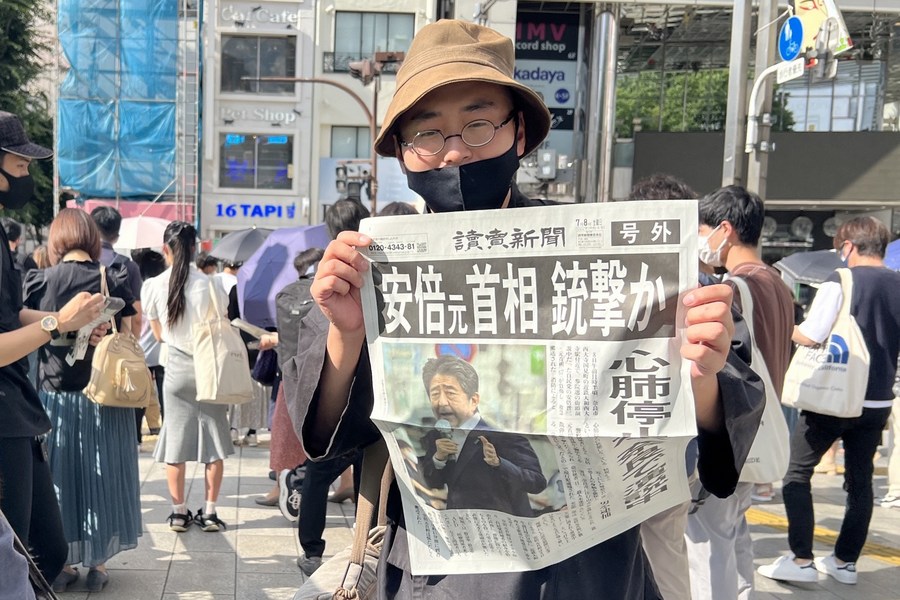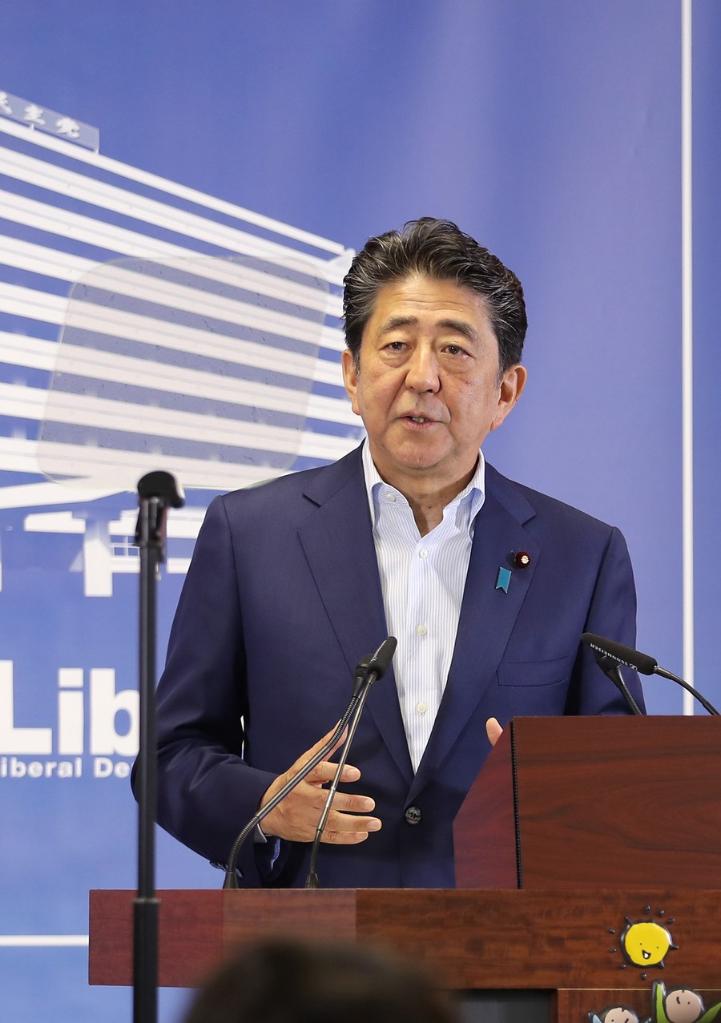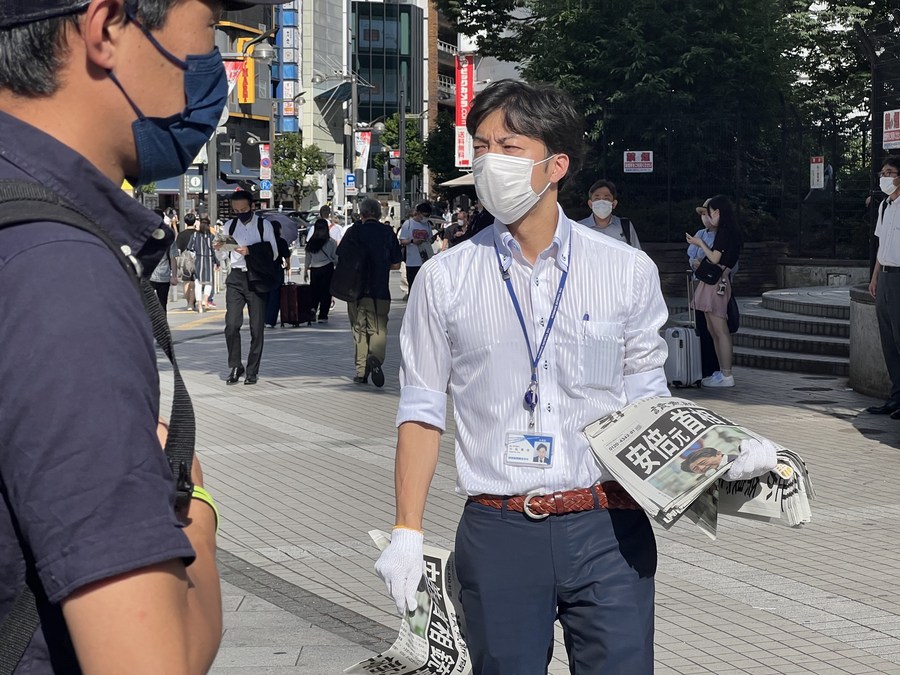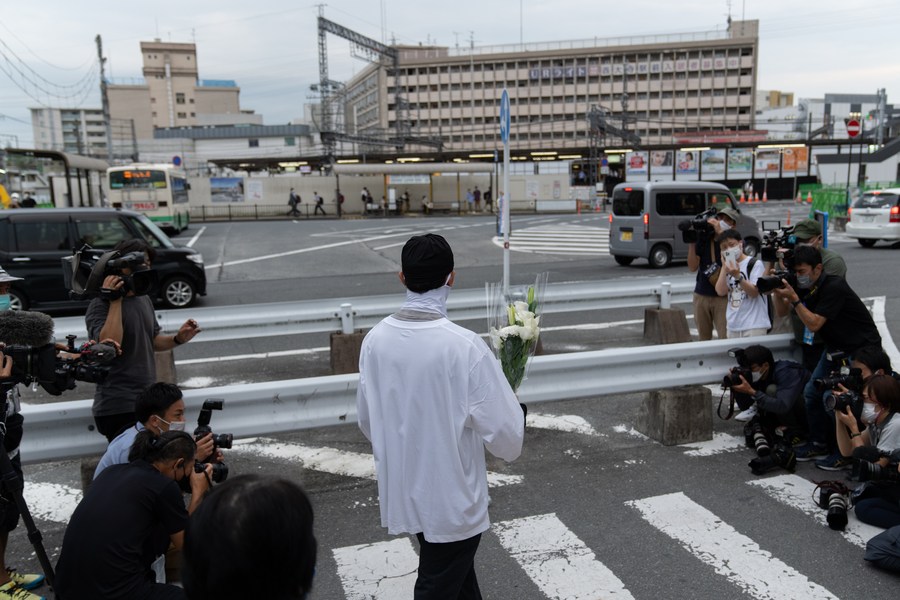* Abe, the country's longest-serving leader, was pronounced dead after being fatally shot by a gunman in western Japan.
* The suspect Tetsuya Yamagami, a former member of the Maritime Self-Defense Force, was arrested at the scene.
* Abe's death has sent shock waves around Japan where gun crime is rare.
by Xinhua writer Ye Shan
TOKYO, July 8 (Xinhua) -- Former Japanese Prime Minister Shinzo Abe has died after being fatally shot Friday by a gunman during a speech in the western city of Nara when campaigning for Sunday's upper house election.
Abe, 67, fell to the ground and was seen bleeding after he was shot from behind at 11:30 a.m. local time (0230 GMT) when he was speaking in front of Kintetsu Railway's Yamato-Saidaiji Station, local police and firefighters said. Two shots were heard on site and blood could be seen on Abe's shirt.
According to the disaster management agency, Abe, the country's longest-serving leader, was wounded and bleeding on the right side of his neck along with internal bleeding confirmed in the left side of his chest.
A campaign staff member tried to revive the former leader as he lay collapsed on the ground by applying a cardiac massage.

A man shows an extra edition of the Yomiuri Shimbun newspaper reporting on the shooting of Shinzo Abe, on a street in Tokyo, Japan, July 8, 2022. (Photo by Sun Jialin/Xinhua)
Abe remained unresponsive on the ground, with his eyes closed, bleeding from his wounds, according to local accounts.
He was rushed to a nearby hospital and showed no vital signs, according to local police and emergency services.
The former prime minister died at 5:03 p.m. local time (0830 GMT), the Nara Medical University Hospital in Kashihara city, which received Abe, said at a press conference in the afternoon.
He was injured in the heart and two places on his neck after being shot, the hospital said, adding that his wound was deep enough to reach his heart.
The cause of death was believed to be blood loss, according to the hospital.
The former prime minister was conscious when admitted but then became unconscious later in the afternoon, the hospital said.

File photo taken on July 22, 2019 shows Shinzo Abe attending a news conference in Tokyo, Japan. (Xinhua/Du Xiaoyi)
Police arrested the suspected gunman Tetsuya Yamagami, a 41-year-old resident of the western city, at the scene.
Yamagami had worked for the Japan Maritime Self-Defense Force for three years until around 2005, Japan's public broadcaster NHK quoted defense sources as saying.
He was apprehended on site and local police retrieved what appeared to be a handmade gun from the vicinity of where Abe was shot, according to government reports.
The suspect was quoted as telling police he intended to kill Abe as he was "dissatisfied" with the former prime minister.
However, "it's not a grudge against the political beliefs of former Prime Minister Abe," the local prefectural police quoted him as saying.
An explosive-like item was found after police searched Yamagami's home in the afternoon.
After canceling campaigning in Yamagata Prefecture and returning to his office in Tokyo by helicopter, Japanese Prime Minister Fumio Kishida condemned the shooting of the former leader "in the strongest possible terms," saying such a barbaric act should never be tolerated.
The assailant's motive is not fully known, he said.

A staff member distributes copies of an extra edition of the Yomiuri Shimbun newspaper reporting on the shooting of Shinzo Abe, on a street in Tokyo, Japan, July 8, 2022. (Photo by Sun Jialin/Xinhua)
Kishida, along with all Cabinet members, was asked to gather in Tokyo to discuss the response to the shooting, Chief Cabinet Secretary Hirokazu Matsuno said.
The death of Abe, who was born in 1954 and graduated from Seikei University in 1977, has sent shock waves around Japan where gun crime is rare, and the incident has triggered an outpouring of political support for the former leader whose career began in 1982 when Abe served as an assistant to the minister of foreign affairs.
Politicians, business leaders and voters in Japan expressed shock and anger over the fatal shooting of the former leader.
"It is an act of absolutely unforgivable political terrorism," Sanae Takaichi, head of the Liberal Democratic Party (LDP)'s Policy Research Council, said before Abe was pronounced dead.
"Shutting the freedom of speech by violence must not happen," Natsuo Yamaguchi, leader of Komeito, junior coalition partner of the LDP, said during a stump speech in Toyohashi, Aichi Prefecture, central Japan.

A citizen mourns at the site where Shinzo Abe was shot in Nara, Japan, July 8, 2022. (Xinhua/Zhang Xiaoyu)
The shooting incident took place two days before Japan's triennial House of Councilors election scheduled for Sunday, fueling doubt over campaigning and election safety.
Kishida said at a press conference in the evening that campaigning will continue, vowing to hold a "free, fair" national election on Sunday.
Abe served as prime minister from 2006 to 2007 and again from 2012 to 2020, but stepped down from his post due to a chronic intestinal disease, becoming the nation's longest-serving prime minister by number of consecutive days in office. (Video reporters: Zhang Xiaoyu, Deng Min; video editors: Lin Lin, Li Qin)■
